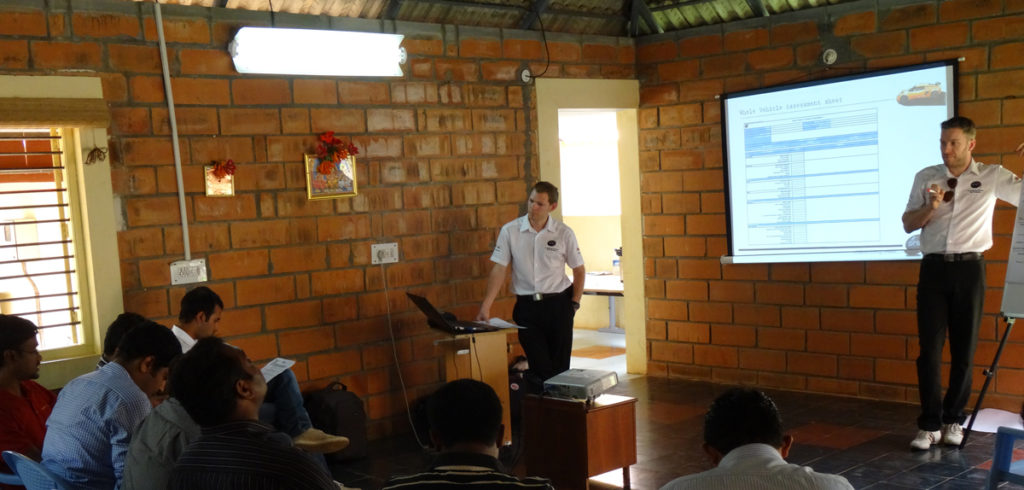Physical testing of vehicles is still a key part of most manufacturers’ development processes. However, it is far from a given that the engineers tasked with such testing will have the correct suite of skills to provide useful feedback on the more subjective areas of the driving experience. To find out how these skills can be developed, Automotive Testing Technology International spoke to Simon Poole, of UK based consultancy Pro2, which specializes in teaching engineers how to drive cars under assessment.
Can you provide a brief overview of the training you provide?
We listen to what the manufacturers want, and it is typically manufacturers. We do work with some consultancies, the Millbrook to MIRAs of the world etc, but normally it is manufactures. They come to us and say we’ve got a group of engineers who are going to be working on a particular program and need to standardize the way they approach whatever it is, such as subjective evaluation or vehicle dynamics, so that everyone is talking the same language.
Or it may be a group of relatively new engineers that are great at the theory and very well educated, but perhaps do not have a handle on the practical skills. For example, things like limit handling or vehicle dynamics-based practical engineering. In effect, driving a car but driving a car in a way to extract information from it.
How important is an ability to drive on or near the limit when assessing a vehicle?
Most important is an ability to diagnose or provide feedback. We effectively get them driving at 90% to allow the extra 10% to be focusing on what is happening to the vehicle. And that is what we are aiming to train. It is about building up a degree of comfort and experience in not worrying about what is happening with the vehicle, but being able to feel what is happening. Whether that is damper settings, tire grip, brake feel, that type of thing. It is building up confidence so that they can drive consistently. If you are testing a component, the last thing you want is the variable to be the driver.
Does that include coaching drivers to follow strict testing protocols?
Yes, that is right. There are some globally accepted standards for delivering specific tests, whether they are ISO standards etc. But generally, there will be a defined test criteria which must be followed to be able to say it conforms to ‘x’ ‘y’ or ‘z’ standard. And that certainly is one of the key aims of a course. It is critical to delivering that standard, but any one standard may require a spectrum of potentially different driving styles.
Where do you draw your instructors from?
We’ve built over the years of a cohort of people that have the right level of experience and have that vital quality of being able to coach people and get on with people as well—being able to translate technical knowledge and understanding into customer-friendly language. They are generally consultant engineers that have a full-time job but work for us because they enjoy the training. It is a slightly different thing to their day-to-day job.

Do you deal with the telemetry setup and data handling side as well as just providing skilled driving personnel?
That is right. And that can be a training element as well. One of the things in the engineering world that is important is the subjective to objective correlation. Engineers generically like to use figures to understand what is going on. A subjective measurement can sometimes be more difficult to objectify. And that is one of the ways that we can bring those two together.
So, for example, tying the sensation a driver gets when they get a slip on the front axle into the data, you are gathering?
Exactly. You may measure slip angles, for example as a way of defining whether something feels like it is generating the right amount of slip or a progressive slip rather than an exponential slip. Objectively you can quantify it by measuring it, but subjectively it must be there as well.
That must require a degree of engineering intuition on the part of any engineer? To then translate that into understanding what they need to change to achieve what they want in terms of that subjective feel?
It does. And one of the things we do as part of that training is, for example, change some aspects on the car and repeat that test and see how that trainee picks up the changes.
On the hardware and software side, you deal with a lot of different manufacturers, and there is quite a variation between manufacturers in terms of the datalogging and analysis setups that they use in-house. Does that mean your instructors have to be familiar with a host of platforms?
It is odd. You would expect there to be a generic way. But you are right that manufacturers prefer their systems that they have used for years. What we tend to do is ideally find engineers within our training team, engineers that had any experience of that hardware or software or of working with a given vehicle manufacturer.
A lot of the things are reasonably generic. Subjective assessment forms, for example, or processes that a manufacturer goes through and what they are looking for are quite common across companies. Tweaking an assessment based on an individual manufacturer’s requirement is relatively straightforward to do.


